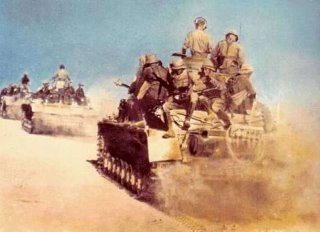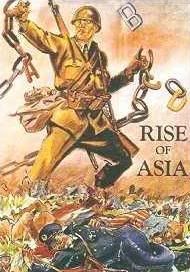War and Oil

The picture on the left is of the German Afrika Korp storming across the Middle-East. Oil was their objective.
Germany, having lost WWI and it's chance at securing a long-term oil supply by taking over the Mesopotamian fields, was desperate for the fuel needed to run an industrial nation.
In 1938 Germany was dependent on imports for about 70% of it's oil supply. 10% of it's supply came from domestic production and overland imports from Romania. Most of the remainder was synthetically produced. Necessity was indeed the Mother of Invention for Germany. I.G. Farben, the worlds largest chemical conglomerate, in association with Standard Oil, had developed a method of producing oil from coal. They were also producing synthetic rubber and Zyclon gas, which would be used to facilitate the holocaust. Much of Farben's production would utilize slave labor supplied by the concentration camps. Farben, the second largest shareholder in Standard Oil, would develop the new technology using American investment monies supplied by Wall Street. By 1940 I.G. Farben is producing 46% of Germany's oil. One of the reasons why Hitler was not taken seriously by the leaders of France and Germany was that it was commonly believed that Germany did not have the fuel capacity to wage all out war.
Hitler's desperate move to attack the Soviet Union was motivated by Germany's need for oil fields. Germany's fuel shortfall could only be filled by capturing the Russian oil fields in the Caucasus mountains. The battle of Stalingrad was Russia's valiant effort to deny Hitler those precious fields. Capturing the Caucasus oil fields would also have opened the door for Germany to advance into the Iranian fields and to deny the vital oil supply to Britain and France. It is ironic that Germany, having overstretched it's supply lines, ran short of oil in it's war for oil. Germany's ability to wage a Blitzkrieg was finished at Stalingrad.
While most of the Middle-East oil fields were under the control of Britain and France, in the pacific Japan was also at the mercy of the oil companies for it's supplies. Heavily dependent on Royal Dutch Shell and Standard Oil, Japan invaded China in search of natural resources. The American government restricted the flow of oil to Japan as a result. Japan presented itself as liberating the countries of Asia from the oppression of the European colonial powers that had robbed them of their precious resources.
With the European colonial powers at war in Europe and the Middle-East, Japan saw the opportunity capture the natural resources of the Pacific region, including the oil fields. The only military power not otherwise engaged in the war elsewhere was the USA, who had moved their Pacific fleet to Hawaii. The main goal of the Japanese attack on the American fleet was to take the East-Indian oil fields. But the Japanese failed to destroy the 4,500,000 barrels of oil that the Americans held at Pearl Harbor. Japan's failure to secure the oil fields effected it's conduct of the war and led to it's ultimate defeat.
Today oil is as important as it was half a century ago..perhaps even more so. Today we are all too aware that the oil is running out, perhaps we have already reached the peak of oil production. The costs of oil, exploration, extraction, refining, and delivery are rising dramatically. When George W. Bush took office in 2000 the cost of a barrel of oil was just $10.00, today it is over $60.00 and is destined to rise much higher. The fact is that there are more industrial nations today, some of which will outgrow the USA and Europe in GDP, and all are dependent on oil as the fuel of their economies. Industries, such as agriculture are oil dependent and rely on oil derivatives for their continued production capacities. Fertilizers, plastics, cosmetics, pharmaceuticals, chemicals, transport, electricity production and even textiles are all heavily dependent on oil.
The wars for oil are still with us. In a speech in Coronado, California in 2005, President Bush stated that America must protect the country's (Iraq) vast oil fields from falling under the control of terrorists and extremists.


<< Home